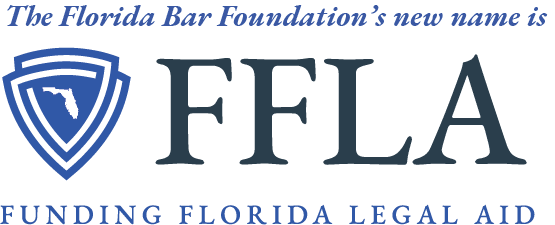The IOTA Rule
CHAPTER 5. RULES REGULATING TRUST ACCOUNTS
5-1. GENERALLY
RULE 5-1.1 TRUST ACCOUNTS
(g) Interest on Trust Accounts (IOTA) Program.
(1) Definitions. As used in this rule, the term:
(A) “Nominal or short term” describes funds of a client or third person that the lawyer has determined cannot earn income for the client or third person in excess of the costs to secure the income.
(B) “Foundation” means The Florida Bar Foundation, Inc. which serves as the designated IOTA fund administrator and monitors and receives IOTA funds from eligible institutions and distributes IOTA funds consistent with the obligations and directives in this rule.
(C) “IOTA account” means an interest or dividend-bearing trust account benefiting The Florida Bar Foundation established in an eligible institution for the deposit of nominal or short-term funds of clients or third persons.
(D) “Eligible institution” means any bank or savings and loan association authorized by federal or state laws to do business in Florida and insured by the Federal Deposit Insurance Corporation, any state or federal credit union authorized by federal or state laws to do business in Florida and insured by the National Credit Union
Share Insurance Fund, or any successor insurance corporation(s) established by federal or state laws, or any open-end investment company registered with the Securities and Exchange Commission and authorized by federal or state laws to do business in Florida, all of which must meet the requirements set out in subdivision (5), below.
(E) “Interest or dividend-bearing trust account” means a federally insured checking account, business or consumer deposit account or sub account, business or consumer deposit account or sub account that does not have a maturity date (non-maturing deposit), or investment product, including a daily financial institution repurchase agreement or a money market fund. A daily financial institution repurchase agreement must be fully collateralized by, and an open-end money market fund must consist solely of, United States Government Securities. A daily financial institution repurchase agreement may be established only with an eligible institution that is deemed to be “well capitalized” or “adequately capitalized” as defined by applicable federal statutes and regulations. An open-end money market fund must hold itself out as a money market fund as defined by applicable federal statutes and regulations under the Investment Company Act of 1940 and have total assets of at least $250 million. The funds covered by this rule are subject to withdrawal on request and without delay.
(F) A “qualified grantee organization” is a charitable or other nonprofit organization that facilitates or directly provides qualified legal services by qualified legal services providers and that has experience in successfully doing so.
(G) “Qualified legal services” are free legal services provided directly to low-income clients for their civil legal needs in Florida, and includes post-conviction representation, programs that assist low-income clients in navigating legal processes, and the publication of legal forms or other legal resources for use by pro se litigants.
(H) A “qualified legal services provider” is a member of The Florida Bar or other individual authorized by the Rules Regulating The Florida Bar or other law to provide qualified legal services.
(I) “Direct expenses required to administer the IOTA funds” means those actual costs directly incurred by the Foundation in performing the obligations imposed by this rule. Direct expenses required to administer the IOTA funds must not exceed 15% of collected IOTA funds in any fiscal year without the court’s prior approval. These costs include preparation of the Foundation’s annual audit on IOTA funds, compensation of staff who exclusively perform the required collection, distribution, and reporting
obligations imposed by this rule and overhead expenses of the Foundation directly related to fulfilling its obligations under this rule. Direct expenses required to administer the IOTA funds also include:
(i) actual costs and expenses incurred by the Foundation to increase the amount of IOTA funds available for distribution;
(ii) funding of reserves deemed by the Foundation to be reasonably prudent to promote stability in distribution of IOTA funds to qualified grantee organizations;
(iii) direct costs related to providing training and technology to qualified grantee organizations, as specified below; and
(iv) direct costs to administer the Loan Repayment Assistance Program and to distribute funds in connection with the program (but not the program funds themselves).
(J) “The court” means the Florida Supreme Court.
(2) Required Participation. All nominal or short-term funds belonging to clients or third persons that are placed in trust with any member of The Florida Bar practicing law from an office or other business location within the state of Florida must be deposited into one or more IOTA accounts, unless the funds may earn income for the client
or third person in excess of the costs incurred to secure the income, except as provided elsewhere in this chapter. Only trust funds that are nominal or short term must be deposited into an IOTA account. The Florida Bar member must certify annually, in writing, that the bar member is in compliance with, or is exempt from, the provisions of this rule.
(3) Determination of Nominal or Short-Term Funds. The lawyer must exercise good faith judgment in determining on receipt whether the funds of a client or third person are nominal or short term. In the exercise of this good faith judgment, the lawyer must consider such factors as the:
(A) amount of a client’s or third person’s funds to be held by the lawyer or law firm;
(B) period of time the funds are expected to be held;
(C) likelihood of delay in the relevant transaction(s) or proceeding(s);
(D) lawyer or law firm’s cost of establishing and maintaining an interest-bearing account or other appropriate investment for the benefit of the client or third person; and
(E) minimum balance requirements or service charges or fees imposed by the eligible institution. The determination of whether a client’s or third person’s funds
are nominal or short term rests in the sound judgment of the lawyer or law firm. No lawyer will be charged with ethical impropriety or other breach of professional conduct based on the exercise of the lawyer’s good faith judgment.
(4) Notice to Foundation. Lawyers or law firms must advise the Foundation, at its current location posted on The Florida Bar’s website, of the establishment of an IOTA account for funds covered by this rule. The notice must include: the IOTA account number as assigned by the eligible institution; the name of the lawyer or law firm on the IOTA account; the eligible institution name; the eligible institution address; and the name and Florida Bar number of the lawyer, or of each member of The Florida Bar in a law firm, practicing from an office or other business location within the state of Florida that has established the IOTA account.
(5) Eligible Institution Participation in IOTA. Participation in the IOTA program is voluntary for banks, credit unions, savings and loan associations, and investment companies. Institutions that choose to offer and maintain IOTA accounts must meet the following requirements:
(A) Interest Rates and Dividends. Eligible institutions must maintain IOTA accounts that pay the highest interest rate or dividend generally available from the institution to its non-IOTA business or consumer account customers, or its non-maturing deposit account customers when IOTA accounts meet or exceed the same minimum balance.
(B) Determination of Interest Rates and Dividends. In determining the highest interest rate or dividend generally available from the institution to its non-IOTA accounts in compliance with subdivision (5)(A), above, eligible institutions may consider factors, in addition to the IOTA account balance, customarily considered by the institution when setting interest rates or dividends for its customers, provided that these factors do not discriminate between IOTA accounts and accounts of non-IOTA customers, and that these factors do not include that the account is an IOTA account. When the Wall Street Journal Prime Rate (“indexed rate”) is between 325 and 499 basis points (3.25% and 4.99%), the minimum interest rate paid net of all fees and service charges (“yield”) must be no less that 300 basis points (3.00%) below the indexed rate in effect on the first business day of each month. When the indexed rate is 500 basis points (5.00%) or above, the yield must be no less than 40% of the indexed rate in effect on the first business day of each month.
(C) Remittance and Reporting Instructions. Eligible institutions must:
(i) calculate and remit interest or dividends on the balance of the deposited funds, in accordance with the institution’s standard practice for non-IOTA account customers, less reasonable service charges or fees, if any, in connection with the deposited funds, at least quarterly, to the Foundation;
(ii) transmit with each remittance to the Foundation a statement showing the name of the lawyer or law firm from whose IOTA account the remittance is sent, the lawyer’s or law firm’s IOTA account number as assigned by the institution, the rate of interest applied, the period for which the remittance is made, the total interest or dividend earned during the remittance period, the amount and description of any service charges or fees assessed during the remittance period, and the net amount of interest or dividend remitted for the period; and
(iii) transmit to the depositing lawyer or law firm, for each remittance, a statement showing the amount of interest or dividend paid to the Foundation, the rate of interest applied, and the period for which the statement is made.
(6) Small Fund Amounts. The Foundation may establish procedures for a lawyer or law firm to maintain an interest-free trust account for client and third-person funds that are nominal or short term when their nominal or short-term trust funds cannot reasonably be expected to produce or have not produced interest income net of reasonable eligible institution service charges or fees.
(7) Confidentiality and Disclosure. The Foundation must protect the confidentiality of information regarding a lawyer’s or law firm’s trust account obtained by virtue of this rule. However, the Foundation must, on an official written inquiry of The Florida Bar made in the course of an investigation conducted under these Rules Regulating The Florida Bar, disclose requested relevant information about the location and account numbers of lawyer or law firm trust accounts.
(8) Distribution of IOTA Funds by the Foundation. No later than 6 months after the fiscal year, the Foundation must distribute to 1 or more qualified grantee organizations all IOTA funds collected that fiscal year except for direct expenses required to administer the IOTA funds, funds required to fund the Loan Repayment Assistance Program, and an additional reserve amount if requested by the Foundation and approved by the court. Prior to distribution, the Foundation must maintain IOTA funds separate from other Foundation funds. The Foundation may not condition distribution of IOTA funds to a qualified grantee organization on payment to the Foundation for any purpose, including training or technology. The Foundation must select qualified grantee organizations based on objective standards it develops. When adopted, the Foundation must provide those standards to both The Florida Bar and the court and also prominently publish those standards on the Foundation’s website. The standards must require that IOTA funds be used to facilitate or directly provide qualified legal services by qualified legal services providers and, to ensure fair distribution of IOTA funds across Florida, must consider relevant data, including:
(A) demographic data provided by an appropriate governmental agency, such as the U.S. Bureau of Labor Statistics; and
(B) data provided by the qualified grantee organization on the use of any IOTA funds previously received.
(9) Use of IOTA Funds by Qualified Grantee Organizations. A qualified grantee organization must expend at least 85% of the IOTA funds received to facilitate qualified legal service providers providing or facilitating the provision of qualified legal services or, if such expenditures in any given year constitute less than 85% of the IOTA
funds received, provide to the Foundation a written justification. A qualified grantee organization must expend no more than 15% of the IOTA funds received for general administrative expenses not directly supporting the provision of qualified legal services and establishing reserves or, if such expenditures in any given year constitute more than 15% of the IOTA funds received, provide to the Foundation a written justification. Except as provided below, general administrative expenses include rent, training, and technology. Expenditures to facilitate qualified legal service providers providing or facilitating the provision of qualified legal services are limited to:
(A) compensation paid to qualified legal service providers;
(B) compensation paid to support staff who are directly assisting qualified legal services providers, such as paralegals;
(C) compensation paid to staff necessary for coordinating volunteer qualified legal service providers; or expenses that otherwise directly facilitate providing qualified legal services, including training, legal research, and technology necessary to the provision of qualified legal services. Compensation includes benefits such as health insurance and bar membership fees.
(10) Reporting by the Foundation. In addition to providing the court with a copy of the annual audit of IOTA funds, the Foundation must annually certify to the court its compliance with this rule’s requirements on the use of IOTA funds. This certification must include, but not be limited to:
(A) the amount of IOTA funds received;
(B) a detailed breakdown of direct expenses required to administer the IOTA funds;
(C) the name of each qualified grantee organization to which distributions were made;
(D) the amount of distribution received by each qualified grantee organization;
(E) a description of the process for determining eligibility and selection of each qualified grantee organization, including the objective standards developed for that purpose;
(F) the total amount received from sources other than IOTA funds;
(G) a detailed summary of the information provided to the Foundation from qualified grantee organizations as required by subdivision (11) of this rule;
(H) the total amount distributed under the Loan Repayment Assistance Program and the number of qualified legal services providers to whom distributions were made; and
(I) any other information the court determines is relevant.
(11) Reporting by Qualified Grantee Organizations. Qualified grantee organizations must annually certify to the Foundation their compliance with this rule’s requirements on the use of IOTA funds. This certification must include, but not be limited to:
(A) the number of qualified legal services providers compensated or facilitated by the use of IOTA funds;
(B) the number of clients receiving qualified legal services paid for or facilitated by the use of IOTA funds;
(C) the number of low-income Floridians who, while not directly represented, are nevertheless assisted by qualified legal services paid for or facilitated by the use of IOTA funds;
(D) the number of hours expended delivering qualified legal services paid for or facilitated by the use of IOTA funds;
(E) the types of matters for which clients received qualified legal services paid for or facilitated by the use of IOTA funds;
(F) an accounting of the use of IOTA funds, including the amount used to establish reserves and pay for overhead and other general administrative expenses;
(G) the total amount received from sources other than IOTA funds by the qualified grantee organization; and
(H) any other information the court determines is relevant.
(12) Required Review. The court will cause a review of the amendments to rule 5-1.1(g) finally adopted by the court on June 18, 2021, to be conducted to advise the court regarding their overall efficacy 2 years after their effective date. The scope of this review may also include any other matters related to the IOTA program.
Foundation Provision of Training and Technology; Grantees’ Funds from Non-IOTA Sources
While the Foundation may use IOTA funds to provide training and technology to qualified grantee organizations, and qualified grantee organizations may use disbursed IOTA funds to pay the foundation for that training and technology, the Foundation may not condition a grant on payment for these, or any, services provided by the Foundation to the qualified grantee organization. For instance, the Foundation may arrange for bulk purchasing of technology which can then be provided to a qualified grantee organization at a lower cost than would be otherwise available to the qualified grantee organization, but the Foundation may not, as a grant condition, require the grantee to pay the Foundation for such services. A qualified grantee organization should, but is not required to, receive funds from sources other than IOTA funds to support its overall mission.
Amended July 20, 1989, effective Oct. 1, 1989 (547 So.2d 117); Oct. 10, 1991, effective Jan. 1, 1992 (587 So.2d 1121); July 23, 1992, effective Jan. 1, 1993 (605 So.2d 252); July 1, 1993 (621 So.2d 1032); July 20, 1995 (658 So.2d 930); April 24, 1997 (692 So.2d 181); June 14, 2001, effective July 14, 2001 (797 So.2d 551); April 25, 2002 (820 So.2d 210); May 20, 2004 (SC03-705) (875 So.2d 448); March 23, 2006, effective May 22, 2006 (SC04-2246), (933 So.2d 417); December 20, 2007, effective March 1, 2008 (SC06-736), (978 So.2d 91); November 19, 2009, effective February 1, 2010 (SC08-1890) (34 Fla.L.Weekly S628a); amended July 7, 2011, effective October 1, 2011 (SC10-1968). Amended June 11, 2015, effective October 1, 2015 (SC14-2088), amended November 9, 2017, effective February 1, 2018; amended June 18, 2021, effective July 1, 2021 (SC20-1543); amended March 16, 2023, effective May 15, 2023 (SC20-1292).
Note: In December 2023, The Florida Bar Foundation changed its named to FFLA.


